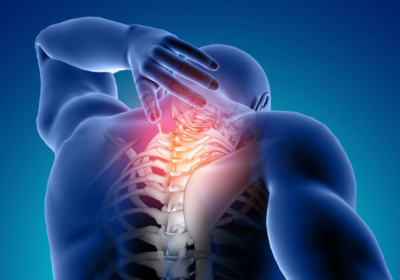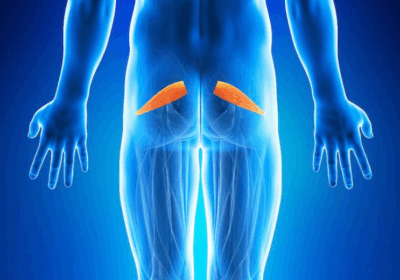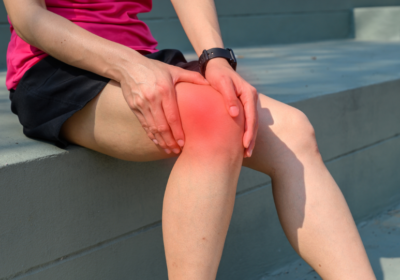THE 8 EFFICACIOUS AYURVEDIC TREATMENTS OF ANKYLOSING SPONDYLITIS IN KERALA

Ankylosing spondylitis is a kind of arthritis wherein the spine ligaments and joints undergo inflammation. Additionally, it’s an autoimmune disorder and could impact peripheral joints such as the hips, ankles, and knees.The word ankylosis means to fuse together.Men are more prone to this disease.Twenty to forty is the age group,that is mostly affected.
In Ayurveda this condition can be correlated to ‘ASTHI MAJJAGATHAVATA’ where in ASTHI and VAYU have ashraya ashrayee relation(mutually dependant).Few symptoms of ASTHI MAJJAGATA VATA are:
SYMPTOMS
- Bhedo asthi parvani: Feels like breaking of joints and bones.
- Sandhi Shoola: Joint piercing pain
- Mamsa bala kshaya: Muscle tissue diminution.
- Aswapna: Sleeplessness
- Santata Ruja: continuous pain.
- Severe low back pain: may radiate after first being localized.
- Numbness can develop from excruciating lower back pain
- Diminished power: can develop from excruciating lower back pain
OTHER SYMPTOMS:
- Back pain that is typically worsening at night when you’re sleeping.
- Morning stiffness.
- Rigid and erect spine.
- Due to back pain ,the patient acquires a stooped posture.
- Loss of appetite.
- Loss of weight.
- The joints between the ribs and spine are impacted, making it difficult to take deep breaths.
- Weakness, fever, and anemia
- Mild inflammation of the eyes.
- Harm to organs, including the heart, lungs, or eyes.
- Rashes on the skin.
- Digestive disorders (such as ulcerative colitis or Crohn’s disease).
DIAGNOSTIC TOOLS
- X-RAY and MRI both help the physician to understand the joint changes and disease progression. i.e. ,X RAY pelvis AP view shows Sacro-iliac sclerosis.
LABORATORY TESTS:
- Human leukocyte antigen B27(HLA-B27):Ankylosing spondylitis patients usually have the HLA-B27 gene variation. The HLA-B27 antigen, a protein present on the surface of white blood cells, is produced by the body as a result of this gene variation. People with the HLA-B27 gene variation can be identified with the use of blood testing for this antigen.
- Erythrocyte Sedimentation Rate: ESR is usually high for these patients. Red blood cells that settle more quickly than usual are a sign of body’s inflammation.
- C Reactive Protein: It’s also a marker of inflammation in the body. CRP levels will also be elevated in Ankylosing Spondylitis patients.
MANAGEMENT OF ANKYLOSING SPONDYLITIS IN MAURYA AYURVEDA
In MAURYA AYURVEDA our eminent physicians provide integrated therapeutic measures, that includes ayurveda, physiotherapy and naturopathy.
The main AYURVEDIC TREATMENTS in our hospital includes,
INTERNAL MEDICATION
- Amruthotharam kashayam tab
- Shaddaranam kashayam tab
- Punarvanadi kashayam tab
- Yogaraja guggulu
- Vasulax
- Rasna shundyadi kashayam
EXTERNAL TREATMENT
-
PODI KIZHI:
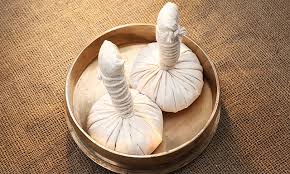
A common Ayurvedic treatment called Podi khizi, or Choorna Swedam, is wrapping warm herbal powders in cloth bundles and massaging them all over the body.
It helps to improve circulation,
- Reduction of inflammation,
- Pain relief,
- Promotes detoxification
- Alleviates musculoskeletal disorders, arthritis etc.
KOLAKULATHATHADI CHOORNAM is used for this kizhi.
-
LEPAM:
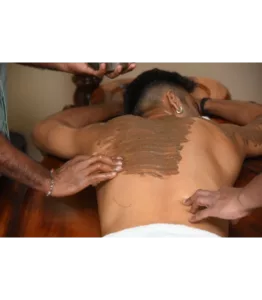
Lepam is a topical treatment that applies a paste made of medicinal herbs to the afflicted area. The selection of the herbal powder and the paste-making medium is based on the specific condition of each individual.
- It helps to reduce swelling and pain.
RASNADI LEEPAM(POOCH) is commonly used in our centre.
-
DHARA:
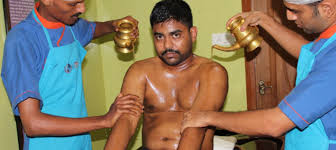
Dhara is an Ayurvedic treatment in which a stream of warm, medicinal liquid is continuously poured over to the body. Oil, buttermilk, milk, or herbal concoctions can be used as the liquid. The course of treatment typically consists of seven to fourteen days of 60 minute sessions. Kashaya dhara and dhanyamla dhara are usually given in this condition. For kashaya dhara DASHAMOOLA kashayam is normally used. This primarily improves,
- Sensory function.
- Provides a calming and soothing effect.
-
NASYAM:
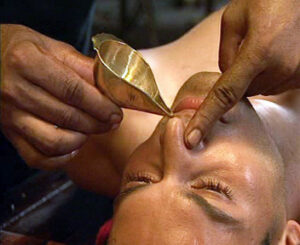
Nasyam is a therapeutic practice in which medicines are administered through the nostrils.Usually ksheera bala taila or anutaila is used here.It helps in
- Pain management
- Stress reduction
- Detoxification
-
NADI SWEDAM:
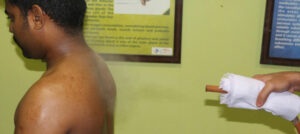
Nadi sweda is a special type of Swedana process in which a special tool called a Nadi sweda yantra is used to apply steam over the entire body or a specific portion of the body in order to promote sweating.In the nadi swedana yantra, herbs combined with water are heated to produce steam. The instrument’s tube allows the steam to travel through once it is produced.
- It helps to relieve pain and oedema.
- It reduces muscle and joint stiffness, softens the body.
- Improves blood circulation.
-
GREEVA VASTHI:
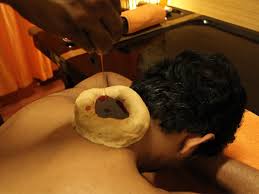
“Vasti” meaning “that which holds,” and “Greeva” meaning cervical (neck) region. Through the use of black gram flour to form a wall, the prescribed therapeutic oil (made warm)is kept in the cervical region for a predetermined amount of time during the Greeva Vasti treatment.
- Improves blood flow to the area of the neck
- Reduces stiffness in the neck
- Lubricates the joints of the cervical vertebrae.
- Relieves pain in the upper limbs, shoulders, and neck
- Lessens the cervical region’s edema
- Lessens the pain that radiates
- Alleviates the upper limb numbness
- Boost the neck region’s muscle strength
ELA KIZHI:
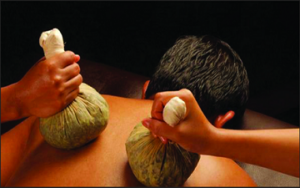
Ela kizhi(patra potali sweda) or potali massage, is an Ayurvedic treatment in which the body is massaged using a cloth bag stuffed with medicinal herbs. “Use of leaf bolus” is what the name Ela kizhi signifies.
- Aids in strengthening muscle.
- Relieves aching joints and muscles.
- Reduces stiffness and discomfort in the body.
- Increases the flow of blood.
-
PICHU:
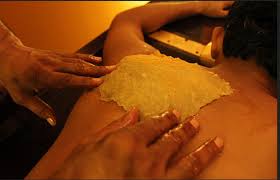
Pichu involves covering the diseased area with a lengthy, thick layer of cotton wool that has been soaked in warm medicinal oil. To keep it warm and healing, the oil is changed on a regular basis. This treatment is regarded as one of the best for treating conditions of the head and spine. It’s very effective in spondylitis conditions by
- Reducing stiffness
- Pain over the affected area.
Normally murivenna or kottamchukkadi taila(by anaylising the condition of patient) is used.
PHYSICAL THERAPY IN ANKYLOSING SPONDYLITIS
1.POSTURE TRAINING:
- Helps to attain a upright posture
- Preventing spinal deformities.
2.SPINAL MOBILITY EXERCISES:
- This exercise emphasises on spinal extension and rotation.
3.STRENGTHENING EXERCISES:
- Strengthening exercises for back and core muscles.
4.LOW IMPACT AEROBIC EXERCISES: 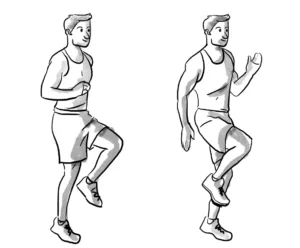
- Exercises like aerobics, cycling, jogging in a place etc helps in improving the mobility of the body.
5.STRETCHING EXERCISES:
- Improves flexibility, improves blood circulation to the concerned area and increases the range of motion.
6.MANUAL THERAPY:
- Techniques like soft tissue mobilization ,joint mobilization etc are done here.
- Which helps to reduce muscle tension, modulate pain, decrease soft tissue inflammation and stiffness, increases joint mobility etc.
7..EDUCATION AND SELF MANAGEMENT:
- Educating patients in self managing the symptoms and helps them attain a quality life.
DIET SUGGESTIONS FROM OUR EXPERTISE DOCTORS:
Patient is advised to follow this diet regimen during the course of treatment:
- Drink plenty of water ie, about(2.5 L-3L).
- Take vegetables in boiled form.
- Hot kanji can be taken.
THINGS TO BE AVOIDED
- Milk and milk products.
- Cold food and pickles.
- Fruits, dry fruits and nuts.
- Bakery products, fast food, fried and oily items.
- Fermented foods like idli, dosa, appam(kerala cuisine).
- Non veg items like meat, fish, egg (if necessary mutton can be consumed in curry form).
- Strenuous activities.


